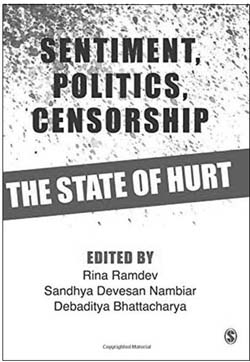The German philosopher Theodor Adorno once stated that the true basis of morality is to be found in bodily feeling and in identification with unbearable pain, that the metaphysical injunction that one shall not inflict pain can only find its justification in the recourse to material reality, i.e., corporeal, physical reality and not in any pure idea, which would be at its opposite pole. As the editors state in the preface, is an enquiry into this ‘materiality of hurt as a felt sentiment, with its own taxonomies of affect. When and how does a materialist understanding of political rationality make way for apprehensions of fear and pain?’ (p. xii) Their book explores the question of bodily feeling, of sentiment and its inevitable entwinement with politics and cesnsorship in the current Indian scenario. Metaphysics, as Adorno stated, has slipped into material existence.
The question of hurt sentiment as the editors write in the introduction is up for grabs in contemporary Indian politics, a situation that Monica Ali has described as the ‘marketplace of outrage’. Mukund Padmanabhan writes in the first chapter that ‘hurt sentiment in this country is often a euphemism for aggressive moral vigilantism, an excuse to take the law into one’s own hands, to perpetrate violence in the name of an emotional victimhood’ (p. 6). Dilip Simeon echoes similar thoughts, ‘When sentiment is used as a means to dominate the speech of others by way of force, then this mobilization of sentiment symbolizes tyranny not democracy … so-called hurt sentiment has now become the cutting edge of a campaign to replace democracy with mobrule’ (pp. 35–36). Rushdie, Ramanujan, Mistry, Doniger, Sekhar Bandopadhyay, Megha Kumar and the fates that their right to free speech met in the name of hurt sentiments are some of the instances that the editors discuss in the introduction. How then is one to differentiate between the genuinely hurt sentiments and ‘opportunism’ or ‘cynical politics’ (p. 165) if only because, ‘the politics of “hurt sentiment” is deeply irruptive, possessing a charge that allows it to rupture and reshape the boundaries of politcal debate as they are drawn at that historical moment’ (p. 164).

